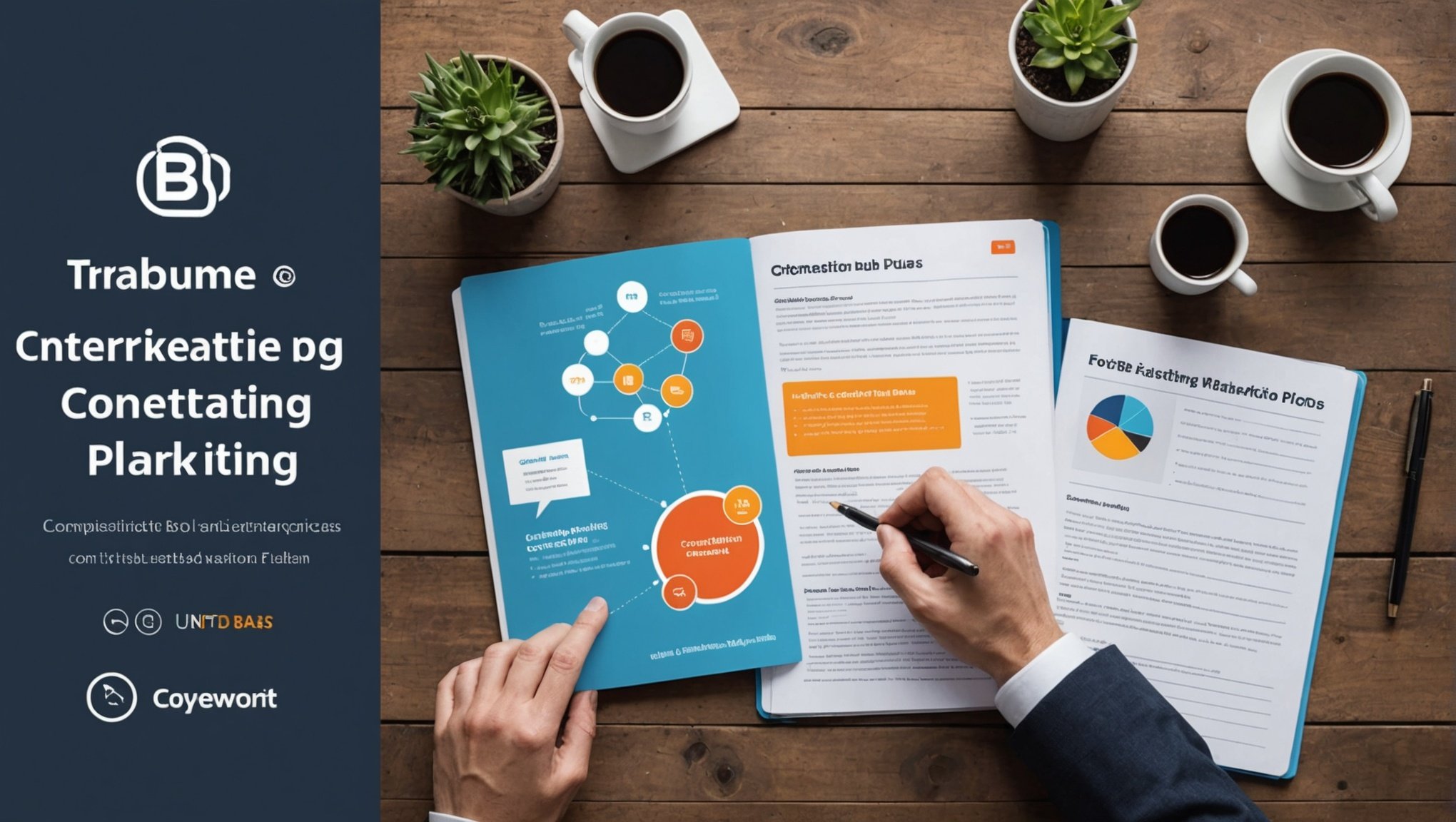Understanding B2B Content Marketing
B2B content marketing plays a crucial role in establishing thought leadership and building trust among businesses. A well-structured marketing strategy can enhance a company’s reputation and expand its audience in the competitive landscape. However, B2B firms in the UK face unique challenges, including varying market trends and the need for highly specialized content tailored to niche industries. This calls for bespoke solutions that resonate with the target audience.
In the UK, B2B companies often juggle between addressing local and global market challenges while staying relevant and consistent. The demand for expertise means content must be backed by data and insights, creating value and addressing specific pain points.
In the same genre : Mastering the Launch of an Effective Digital Wallet Solution for UK Retailers
Current trends in the B2B content marketing sphere include using innovative formats, such as interactive content and personalized experiences, to captivate audiences. Emphasis on sustainability and ethical business practises is also rising among UK businesses, reflecting global market trends. Keeping abreast of these evolving trends while maintaining a focus on authenticity is essential.
In summary, UK B2B firms need dynamic marketing strategies to effectively harness these trends, ensuring their content remains impactful and informative in a constantly shifting market.
Also to discover : Unlocking the Advantages: How Digital Transformation Revolutionizes Financial Services in the UK
Defining Your Target Audience
Understanding your target audience is crucial for any business’s success. It involves identifying specific groups of potential customers, also known as buyer personas, and utilising market segmentation to hone in on these groups effectively.
Importance of Knowing Your Audience
To craft effective marketing strategies, comprehending your audience’s needs is vital. It ensures your messaging resonates with potential customers, increasing engagement and conversion rates. A clear understanding of your audience aids in allocating resources more efficiently.
Creating Comprehensive Buyer Personas
Creating detailed buyer personas involves researching demographics, purchase behaviours, and pain points of your potential customers. These personas help in personalising interactions and tailoring marketing strategies to meet their specific needs, leading to improved customer satisfaction and loyalty.
Segmenting the UK Market for Effective Targeting
Market segmentation involves dividing the UK market into distinct segments to better understand audience preferences. Utilising various tools such as surveys and data analytics can reveal insights into typical B2B buyers’ characteristics, like industry needs and decision-making processes. Effective segmentation enables businesses to target their audience precisely, offering more relevant products and services. By focusing on audience segmentation, businesses can refine their marketing efforts, ensuring each segment receives messages that resonate with their unique attributes.
Setting Clear Objectives and Goals
When it comes to B2B marketing, defining clear business goals is essential for success. Without specific objectives, strategies can become unfocused, leading to wasted efforts and resources. A robust framework like SMART goals can streamline this process. SMART stands for Specific, Measurable, Achievable, Relevant, and Time-bound. By setting SMART goals, businesses ensure that their targets are well-defined and realistic, providing a clear roadmap to success.
In achieving these marketing objectives, it is crucial to choose relevant performance metrics. These metrics act as indicators of progress and signal when adjustments are necessary. Metrics could include lead conversion rates, customer acquisition costs, or engagement rates, each serving as a benchmark for evaluating the effectiveness of marketing campaigns.
For instance, in B2B marketing, setting a goal to increase lead generation by 20% within six months is a practical illustration of a SMART goal. It specifies an exact target (20%), is measurable (tracking lead count), achievable, relevant to marketing objectives, and has a clear timeframe (six months).
Regularly reviewing these performance metrics helps maintain alignment with objectives, ensuring that marketing strategies remain dynamic and effective in a fast-paced business environment.
Developing a Content Strategy
Creating an effective Content Strategy is crucial for engaging your audience and achieving your business goals. In B2B Engagement, selecting appropriate Content Types and aligning them with your audience’s needs can make a significant difference.
Choosing the Right Content Formats
Choosing the right Content Formats involves understanding what resonates with your audience. For B2B, formats such as whitepapers, case studies, and webinars tend to be effective as they offer in-depth information suitable for decision-makers. Each format has unique advantages; for instance, whitepapers build authority through detailed analysis, while webinars engage through interactive discussion.
Mapping Content to the Buyer Journey
Mapping your content accurately to the Buyer Journey stages ensures that your audience receives relevant information at every point. At the awareness stage, introductory blog posts or infographics can capture interest. Consider detailed guides and product comparisons at the consideration stage, and case studies or testimonials during the decision stage to build trust and guide the final choice.
Planning a Content Calendar
To maintain consistency, planning a Content Calendar is essential. Regular scheduling helps manage publishing efforts and ensures a steady flow of content. Best practices include keeping a balance of different content types and planning content well in advance to stay agile in responding to market changes.
Creating Compelling Content
Crafting engaging content is essential in today’s competitive B2B landscape. To write effective B2B content, focus on clear, concise messaging that directly addresses your audience’s needs. It’s crucial to understand their challenges and offer practical solutions. By doing so, you not only grab attention but also build trust and reliability.
Incorporating storytelling into your business communication can significantly enhance your content’s impact. A well-told story can simplify complex ideas, making them more relatable and memorable. When storytelling is used correctly, it transforms a dry message into an engaging narrative that resonates emotionally with your audience. By illustrating real-life scenarios, you demonstrate how your solutions have benefitted others, thereby adding credibility.
Another aspect to consider is the variety of formats that can engage B2B audiences. Traditional whitepapers and reports are valuable, yet interactive content such as infographics, videos, and webinars can also hold attention effectively. Experimenting with different formats ensures that you cater to different preferences, thereby broadening your reach. Focus on delivering content that is not only relevant and informative but also engages the audience, prompting them to explore further and engage with your offerings.
Promoting Your Content
Content promotion is essential to maximize visibility and impact. Distribution channels and effective engagement strategies are critical for achieving this.
Utilizing Social Media for B2B
When promoting content in a B2B setting, social media platforms offer powerful distribution channels. LinkedIn and Twitter are excellent platforms for reaching other businesses. To maximize engagement on these platforms:
- Create compelling posts that resonate with your target audience.
- Use hashtags strategically to expand reach.
- Engage with your audience by responding to comments and starting conversations.
Engagement strategies on these platforms can involve sharing industry news or thought leadership insights, establishing your brand as a knowledgeable and trustworthy entity.
Leveraging Email Marketing
Email marketing remains a vital engagement strategy. Through personalized campaigns, businesses can directly reach their audience. Segment your audience to tailor content and enhance relevance. Consistent, informative newsletters can strengthen relationships with existing clients while reaching potential leads.
Partnerships and Influencer Collaborations
Collaborating with industry influencers expands your reach and credibility. Influencers can introduce your content to a broader audience, utilising their established trust and authority. Partnering with complementary businesses also creates synergies, offering co-branded content or webinars, adding value for both networks involved. Leveraging these partnerships heightens your content’s exposure.
Measuring and Analyzing Success
Effective performance measurement is vital for understanding the impact of your marketing efforts. Several tools, such as Google Analytics, can provide detailed insights into your content’s effectiveness. By tracking website traffic and user engagement, you gain a deeper understanding of what resonates with your audience.
Using metrics like bounce rate, time on page, and conversion rates, you can evaluate how well your content performs. These analytics point towards areas of improvement and help to refine your strategies. For example, if a particular piece boasts a high conversion rate, understanding its components can inform future content creation.
Analyzing this performance data allows businesses to pinpoint the actions that yield the best results. This understanding guides strategic adjustments, enabling more efficient marketing tactics. Crucially, it’s not just about collecting data, but also interpreting it to drive decisions.
Understanding ROI in marketing, especially for B2B content, is essential. It involves comparing the earnings generated by your marketing activities against their costs. A positive ROI indicates successful strategies, while a negative one suggests reassessment. By continuously evaluating ROI, companies can tailor their approaches to ensure sustainable growth and optimizing resource use.
Case Studies of Successful B2B Campaigns
Understanding B2B case studies offers valuable insights into crafting effective marketing strategies. These marketing success stories highlight industry examples where businesses have excelled. Exploring these campaigns provides actionable lessons and practical applications.
Overview of Notable Campaigns
Numerous companies have undertaken successful B2B marketing campaigns recently. For instance, technology firms have utilised content-driven strategies to engage their audience. By creating informative and valuable content, they have managed to capture the interest of potential clients, leading to increased brand visibility. Additionally, industries such as healthcare have leveraged digital channels for direct communication, enhancing their connection with partners.
Lessons Learned from Success Cases
From these narratives, several lessons can be drawn. First, understanding the specific needs of the business audience is crucial. Successful campaigns focus on providing solutions rather than just promoting products. Secondly, balancing digital and traditional marketing methods can maximise reach. Furthermore, flexibility in adapting to market changes proved essential.
Application of Best Practices
These B2B triumphs suggest best practices for other companies to implement. For UK companies, adopting a personalised approach in communication with clients can lead to greater engagement. Moreover, integrating data-driven insights ensures that marketing efforts align perfectly with evolving client demands. By emulating these strategies, businesses can enhance their own marketing efficacy.
Tools and Resources for Content Marketing
Navigating the vast world of content marketing requires the right mix of marketing tools and content creation resources. Whether you are generating, distributing, or analyzing content, having suitable tools can significantly enhance your strategies. Let’s explore some recommended resources for each stage of the content marketing process.
For content creation, software like Canva or Jasper simplifies the design and writing process, making it accessible for even non-designers or non-writers. Explore HubSpot and Hootsuite for content distribution, ensuring your message reaches the right audience at the right time. HubSpot’s B2B marketing software is particularly useful for businesses looking to automate and personalize their marketing efforts efficiently.
Staying updated with the latest trends and technologies can be challenging, but dedicating time to continuous learning is crucial. Platforms like Coursera and LinkedIn Learning are great for expanding your content marketing knowledge. Also, consider joining industry webinars or reading reputable blogs regularly.
Technology integration in B2B marketing strategies is increasingly essential. Embracing advanced software and platforms not only streamlines processes but also enhances decision-making through data analytics. Such integration can lead to more targeted, effective marketing campaigns, ensuring higher engagement and conversion rates.











